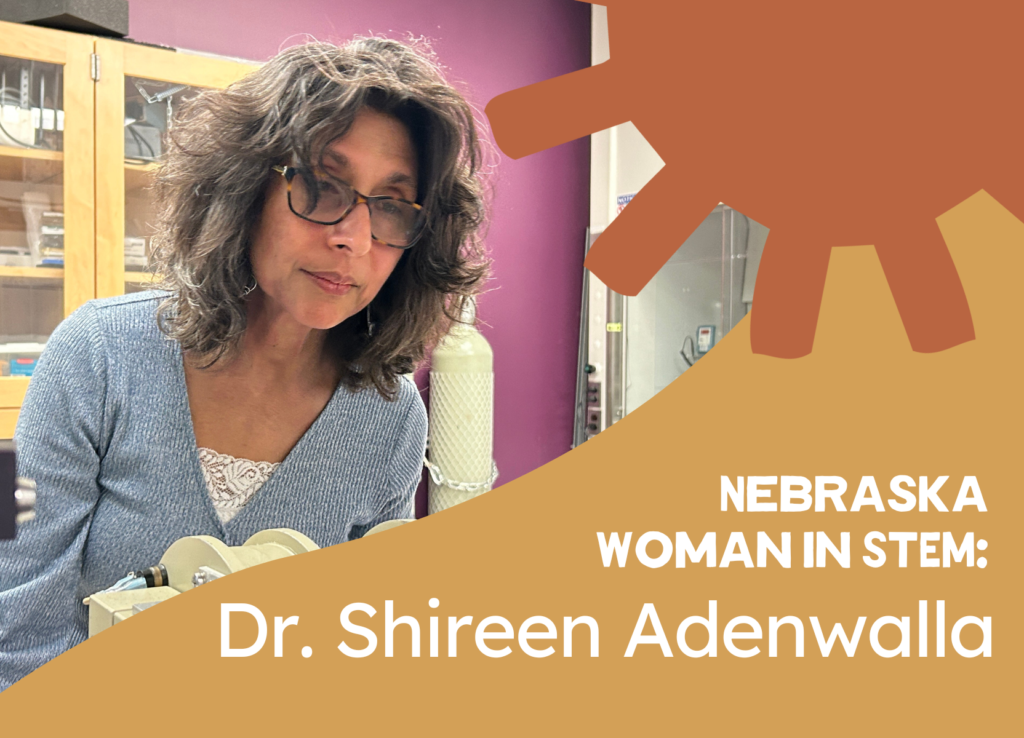Nebraska Women in STEM talked to University of Nebraska – Lincoln Professor Dr. Shireen Adenwalla about her career in the very male-dominated field of physics.

“Being a scientist is a lot of fun. People don’t tell you how much fun it is.”
Dr. Shireen Adenwalla was an eighth grader in India when she took her first physics class. “I remember thinking, ‘Oh thank goodness somebody has thought about this stuff!’ It was such a relief to know that,” said Adenwalla.
Not long after her class began, she realized it was her passion. “It was like it was waiting there for me. I had never known about it, but it felt like it had been waiting for me.”
After being in an all-girls high school, it was at a co-ed college that Adenwalla first experienced being treated differently as a woman. Her first memory of sexism came in college when she performed better on a math test than a high achieving male classmate. He was irritated with her, and her response was to acknowledge that she did indeed outperform him. Her response did not make her popular, and others told her to be more tactful.
When she moved to the United States to pursue her doctoral degree at Northwestern University, she felt intimidated. “There was the culture shock, but there was also the being in an all-male environment shock. And being the ‘other’ person.”
Adenwalla said her fellow male graduate students were not the issue. Many (but not all) of the all-white male faculty were openly sexist. She explained that one professor said “’you are the first women I’ve ever hired and if you do okay, I might hire another one.’ That was a lot of pressure to be under” she said.
When it came time for her and her husband to search for faculty positions, her husband found a position at the University of Nebraska – Lincoln (UNL) and she joined him by taking a research assistant position. After several years of getting her research funded and attracting graduate students, in 2003 there was an open call for faculty positions, and she was selected. Today, she is a tenured professor of Physics and Astronomy.
Throughout her career, the heavily male-dominated environment in physics posed challenges. Adenwalla even had students write in reviews that women should not teach physics, but she was not deterred. She said it helped that her parents were so supportive of her pursuing physics and laid a foundation of confidence. “I didn’t grow up thinking that women couldn’t do physics, and I was surprised when people were surprised that I was a woman in physics,” said Adenwalla. “I just wondered, what difference did it make?”
Adenwalla is very happy that physics is becoming more inclusive and wants to continue to see progress, including seeing more women in faculty positions and in positions of power. There was only one when she came to UNL and now there are three women in full professor positions including herself. She’s pleased policy changes have come along with it and noted that she has seen attitudes change towards maternity leave.
In terms of choosing career paths, Adenwalla believes everyone should get to pick their own path, no matter what other people say. Her advice for students considering a science career is to “not worry too much about what other people think of you. I would worry more about doing the work in front of you, and that work can be your homework or your quizzes. Go work for someone in a lab. It is so much fun, you’ll never look back.”